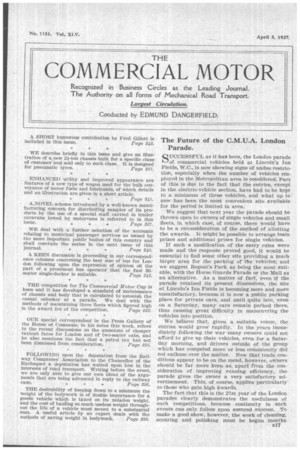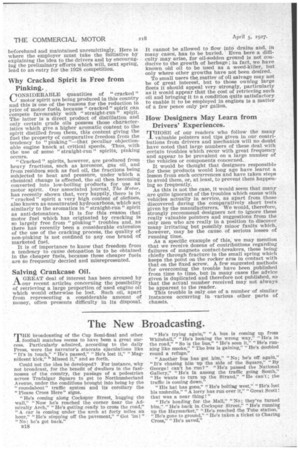The Future of the C.M.U.A. London Parade.
Page 35

Page 36

If you've noticed an error in this article please click here to report it so we can fix it.
SUCCESSFUL as it has been, the London parade of commercial vehicles held at Lincoln's Inn Fields, W.C., is now showing signs of undue restric tion, especially when the number of vehicles employed in the Metropolitan area is considered. Part of this is due to the fact that the entries, except in the electric-vehicle section, have had to be kept to a minimum of three vehicles, and what up to now has been the most convenient site available for the period is limited in area.
We suggest that next year the parade should be thrown open to owners of single vehicles and small fleets, in which case, of course, there would have to be a reconsideration of the method of allotting the awards. It might be possible to arrange team prizes and additional prizes for single vehicles.
If such a modification of the entry rules were made and the response proved good, it would be essential to find some other site providing a much larger area for the parking of the vehicles, and we suggest Regent's Park as being the most suitable, with the Horse Guards Parade or the Mall as an alternative. As a matter of fact, even if the parade retained its present dimensions, the site at Lincoln's Inn Fields is becoming more and more unsatisfactory, because it is now a public parking place for private cars, and until quite late, even on a Saturday, many cars remain parked there, thus causing great difficulty in manceuvring the vehicles into position.
We believe that, given a suitable venue, the entries would grow rapidly. In the years immediately following the war many owners could not afford to give up their vehicles, even for a Saturday morning, and drivers outside of the group which has competed more or less consistently did not enthuse over the matter. Now that trade conditions appear to be on the mend, however, owners should be far more keen as, apart from the consideration of improving running efficiency, the parade gives the owner a very satisfactory advertisement. This, of course, applies particularly to those who gain high awards.
The fact that this is the 21st year of the London parades clearly demonstrates the usefulness of such competitions, because continuity in such events can only follow upon assured suceess. To make a good show, however, the work of cleaning, scouring and polishing must be begun "months beforehand and maintained unremittingly. Here is where the employer must take the initiative by explaining the idea to the drivers and by encouraging the preliminary efforts which will, next spring, lead to an entry for the 1928 competition.
Why Cracked Spirit is Free from Pinking.,
CONSIDERABLE quantities of " cracked " motor spirit are being produced in this country and this is one of the reasons for the reduction in price of motor fuels, because " cracked " spirit can compete favourably with " straight-run "
The latter is a direct product of distillation and only certain crude oils possess those characteristics which give a higher aromatic content to the spirit distilled from them, this content giving the fuel the property of comparative freedom from the tendency to "pinking "—that peculiar objectionable engine knock at critical speeds. Thus, with the use of some " straight-run " spirits, pinking occurs.
" Cracked " spirits, however, are produced from heavy fractions, such as kerosene, gas oil, and from residues such as fuel oil, the fractions being subjected to heat and pressure, under which a chemical change is effected, the oil then becoming converted into low-boiling products for use as motor spirit. Our associated journal, The Motor, has recently shown that, very happily, there is in " cracked " spirit a very high content of olefines, also known as unsaturated hydrocarbons, which act similarly to the aromatics In" straight-run" spirit
as anti-detonators. It is for this reason that motor fuel which has originated by cracking is so largely free from " pinking " troubles and, as there has recently been a considerable extension of the use of the cracking process, the quality of non-pinking is not confined to any one brand of marketed fuel.
It is of importance to know that freedom from a tendency to cause detopation is to be obtained in the cheaper feels, because these cheaper fuels are so frequently decried and misrepresented.
Salving Crankcase Oil.
A GREAT deal of interest has been aroused by ili-our recent articles concerning the possibility of retrieving a large proportion of used engine oil which would otherwise be lost. Such oil, apart from representing a considerable amount of money, often presents difficulty in its disposal.
It cannot be allowed to flow into drains and, in many cases, has to be buried. Even here a difficulty may arise, for oil-sodden ground is not conducive to the growth of herbage; in fact, we have known old oil to be used as a weed-killer, but only where other growths have not been desired.
To small users the.matter of oil salvage may net be of great interest, but to those owning large fleets it should appeal very strongly, particularly as it would appear that the cost of retrieving such oil and bringing it to a condition quite satisfactory to enable it to be employed in engines is a matter of a few pence only per gallon.
How Designers May Learn from Drivers' Experiences.
MHOSE of our readers who follow the many valuable pointers and tips given in our contributions from drivers and mechanics will no doubt have noted that large numbers of these deal with certain troubles which recur with great frequency and appear to be prevalent on a large number of the vehicles or components concerned..
It would be thought that designers responsible for these products would long ago have learnt a lesson from such occurrences and have taken steps to avoid them, or, at least, to prevent them happening so frequently.
As this is not the case, it would seem that many are quite ignorant of the troubles which ensue with vehicles actually in service, as apart from those discovered during the comparatively short tests given by the manufacturers. We would, therefore, strongly recommend designers not to ignore these really valuable pointers and suggestions from the only men who are really in a position to discover many irritating but possibly minor faults which, however, may be the cause of serious losses of running time.
As a specific example of this, we may mention that we receive dozens of contributions regarding failures of magneto contact-breakers, these being chiefly through fracture in the small spring which keeps the point on the rocker arm in contact with that on the fixed screw. A few suggested methods for overcoming the trouble have been published from time to time, but in many cases the advice given is duplicated and therefore not published, so that the actual number received may not always be apparent to the reader. This trouble is only one of a number of similar instances occurring in various other parts of chassis.






































































































